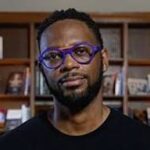We are currently at an inflection point, with a nation on the precipice. In moments of national crisis, presidential administrations often soothe a restless population with aspirational rhetoric. Lyndon B. Johnson said in his 1968 address to the nation after Martin Luther King’s assassination, “Men who are white — men who are Black — must and will now join together as never in the past to let all the forces of divisiveness know that America shall not be ruled by the bullet, but only by the ballot of free and of just men.”
Contrast Johnson’s words with President Donald Trump saying “I hate my opponent, and I don’t want the best for them” at the memorial service for slain conservative activist Charlie Kirk.
As a professor of philosophy, I am trained in and fascinated by language and how it helps us make sense of our lives.
People often suggest fighting disagreeable speech with more speech as a strategy. The idea is to drown out bad or offensive ideas with better ones. Sadly, this can make the divisions between us even worse. This is because our public discourse is increasingly filled with provocation, propaganda and misinformation. Curated algorithms on social media, foreign influence through bots, and manipulation by trolls exploit existing divides between us, making it harder to establish trust. More speech alone cannot get us out of the trouble we are in.
For example, consider the low public confidence in mass media. According to a 2024 Gallup poll, only 31% of Americans expressed a “great deal” or “fair amount” of trust in media to report news “fully, accurately and fairly.” One possible cause of this distrust is the proliferation of options on cable and social media for news, especially tailored to one’s political interests. More speech has not energized people to become more discerning; instead, it has only made them more fatigued and confused.
In the wake of Kirk’s death, Trump has used sweeping language to paint a broad “far left” network and suggested beating the hell out of “radical left lunatics.” Vice President JD Vance has claimed “left-wing” Americans are likely to defend and celebrate political violence. And Attorney General Pam Bondi has threatened to go after anyone who “targets” others with “hate speech.”
Instead of calling for unity like Johnson, Trump and his allies weaponize charged language for political gain and to silence their opponents’ voices.
These types of comments have a dampening effect on free speech. We already see the impacts of Trump’s campaign against his political enemies. The network ABC temporarily suspended Jimmy Kimmel’s show following FCC Chair Brendan Carr’s threats to revoke ABC affiliate licenses for comments Kimmel made following Kirk’s death.
What is needed now is responsible speech. Responsible speech connects us to a shared project and provides a basis for shared understanding. Advocating free speech for free speech’s sake threatens to produce results similar to the dangerous rhetoric some believe leads to political violence. This is because it fails, on its own, to help bring about a shared world of meaning necessary for democratic collaboration. We simply cannot come together to identify and address problems without some sense of shared meaning.
Responsible speech must be honest speech. This means honestly wrestling with things like the overwhelming evidence of politically-motivated violence from right-wing extremists, not scrubbing the U.S. Justice Department’s website of its existence.
Responsible speech must be truthful as well. This means avoiding the vague, sweeping language of vilification that the president and his allies have been engaging in. It also means acknowledging all the facts, not selectively highlighting those things that boost only your side.
Lastly, responsible speech calls us to a joint project of meaning-making. Our moral language can only have broad currency if we all have a hand in developing it. Too many voices have been ignored or suppressed in the name of a self-serving morality concocted by an elite few.
Author Noel Rae, for example, details how Christian slaveholders used the bible to rationalize their participation in this evil practice. The Africans being held were not consulted for their views on the matter.
Attempts to secure free expression through repression, political point scoring and vagaries threaten to undo our nation completely. Political leaders and those in the public eye would do well to remember their special responsibility to champion responsible speech. The livelihood of the nation depends on it.
